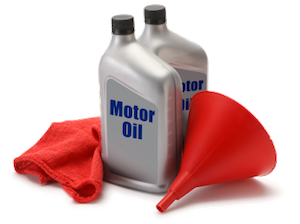home | e-mail | terms of use
oilspecifications.org
The most recent GM motor oil specification: Dexos 1 Gen 3
Motor oil development is primarily driven by environmental considerations, the reduction of CO2 emissions and increase in fuel economy, through impacting the development of engine technologies. The increasingly strict emission regulations force engine manufacturers to continuously improve the engine designs, which has an impact on motor oil standards and specifications. The properties and components of the motor oils greatly affect engine performance and emissions.
Not only do engine manufacturers create higher performance engines, but these engines also become increasingly compact, and make use of special features like gasoline direct injection (GDI) or turbocharging, which improve fuel efficiency. The effect this has on fuel development is beyond the scope of this article, but let's address the impact on motor oils.
Engine improvements drive motor oil development. General Motors announced the 3rd generation of the GM Dexos 1™ motor oils at the end of 2021. This new category changes the expectations towards motor oils used in GM engines. The Dexos 1 specification already expected more from motor oils than the typical industry standards, and this change increased these expectations even further.
Dexos 1™ Gen 2, the specification Gen 3 is now replacing was introduced in 2015. The new specification comes with stricter limits. These extend to resistance against oxidation, protection against deposit and sludge formation and piston cleanliness. The new limits come with strict test criteria in the GM approval system. The expectations exceed other industry standards, like API SP and ILSAC GF-6.
GM made significant changes in its test suite, but also kept some tests from Gen 2.
- Sequence IIIH is replaced by GM's own oxidation and deposit formation test with stricter limits than before.
- The Sequence VH Sludge test imposes a strict criteria regarding engine cleanliness and effectiveness. In the meantime, turbocharger deposits will continue to be evaluated using the same tests as in Gen 2.
- Gen 3 also adds a fuel efficiency test, which is performed using a Chevrolet Silverado.
- Besides engine tests, so test bench limits change too. For example, the Noack volatility test limit is decreased from 15% to 12.5%.
- Gen 3 contains tests regarding Low Speed Pre-Iginition (LSPI) too. GM uses its own test criteria for this, just like other manufacturers. It contains the GSMPI test, which is similar to the test Ford uses for LSPI in GF-6, even though operating conditions differ.
It's interesting to note that Gen 3 seems less demanding when it comes to wear resistance than Gen2 was. This is because GM replaced the RNT engine test with a test bench test (MTM). Nevertheless, the IVB wear test – known from API and ILSAC specifications – continues to stay in Gen 3.
Gen 4 is planned for 2027.
Further reading: https://360.lubrizol.com/Specifications/GM/GM-dexos1


